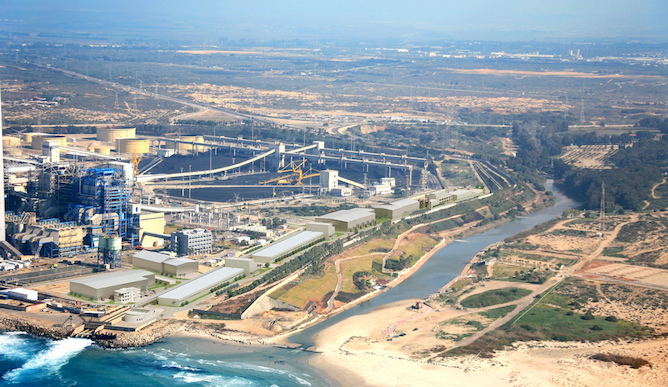
Eli Sperling, CIE
April 1, 2016
Desalination, the removal of minerals from brackish or salt water to produce water suitable for consumption and irrigation, has long stood as a crucial resource management technology in Israel. Driven by the arid climate and limited fresh water supply, Israel turned to desalination to ensure water security. In 2016, Israel leads the world in desalination advancements. The small country of roughly 8 million people boasts five active plants that currently produce over 50% of Israel’s drinking water. This success has even opened the possibility of exporting both fresh water and proprietary technologies to its immediate neighbors with important political outcomes.
Previous to the commercial availability of this technology (2005), Israel’s conventional water-sources were being rapidly depleted as a result of low rainfall, a growing population and a rising demand for drinking and agricultural water. Constant uncertainty about needed water supply has dominated Israel’s history. Prior to the state’s establishment, purchase of lands in the Upper Galilee were critical to Jewish nation building to assure that the headwaters of the Jordan River were under Jewish control. Conflict between Syria and Israel in the 1950s often centered on the flow of water into the Sea of Galilee and from it into the Jordan River and into the national water carrier, opened in 1964. Current shortages have been almost entirely alleviated by the desalination plants; they continue to be expanded both by number and output capacity.
Lack of potable water affects the entire Middle East: countries including Bahrain, Egypt, Qatar, and Saudi Arabia have developed their own desalination facilities as they lessen the uncertainty of their own limited water supplies. Jordan, which also sits astride the Jordan River, quietly had a water sharing arrangement with Israel, prior to the signing of their peace treaty in October 1994. In February 2015, Jordan signed a water agreement with Israel.
This agreement focuses on both countries making efforts to replenish the Dead Sea and produce drinking water in a desalination plant under construction in the Jordanian city of Aqaba on the Red Sea. Knowledge sharing bolsters this cooperative effort. A cohort of roughly half a dozen Jordanian students currently study hydrology and microbiology alongside Israeli, Palestinian, Turkish, and other international researchers and students at Israel’s Ben-Gurion University (BGU), which houses the Zuckerberg Water Institute, one of the world’s leading desalination research facilities. They will carry back knowledge critical to the success of a budding desalination industry. Hydrologist and BGU Almunus Amer Sweity is in fact the first Jordanian citizen to have received a Ph.D. (2015) in Israel, which he did at the Zuckerberg Water Institute under the supervision of Israeli Professor Moshe Herzberg. In a 2015 interview with the Times of Israel, Sweity noted, “I want to do something for the coming generations in all the countries in the region. Science doesn’t stop at borders.”
Herzberg’s efforts to promote regional cooperation and sustainability through hydrology research have likewise garnered the support of USAID’s Middle East Regional Cooperation project. In 2010, USAID MERC issued Herzberg and Palestinian Prof. Mohammed Saleem Ali-Shtayeh from Nablus a $650,000 grant for a joint water purification project.
With the combination of a 14-year drought, which NASA claims to be the most severe the Middle East has seen in 900 years, and continued rapid population growth, desalination is becoming increasingly important to the region’s future. Resolving the water shortages under the West Bank will likewise be critical to any sustained political agreement between Israel and the Palestinian population there. Collaborations such as the Jordanian-Israeli water agreement and Herzberg and Ali-Shtayeh’s water-purification project, in addition to cutting edge research and educational facilities open to students from all over the globe, suggest that solving water needs may be a core means to reduce contentious feelings between populations. Israel’s path-breaking work as well as sharing of expertise and technology in water resource development offer real opportunities to reduce a major cause of regional tensions.
http://www.timesofisrael.com/israels-first-jordanian-phd-wants-to-bring-peace-through-water/
http://forward.com/news/breaking-news/335122/14-year-israel-drought-was-worst-in-900-years/
http://www.israel21c.org/israeli-palestinian-team-to-develop-clean-water-solutions/
